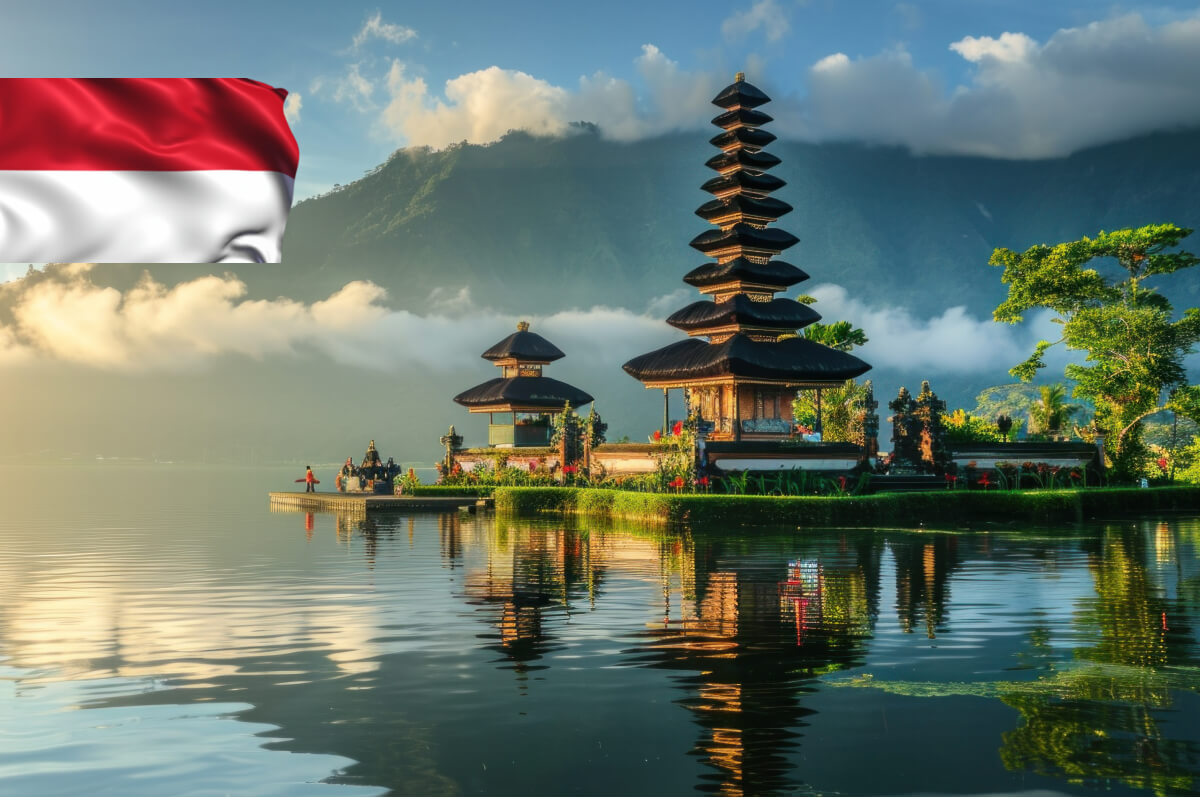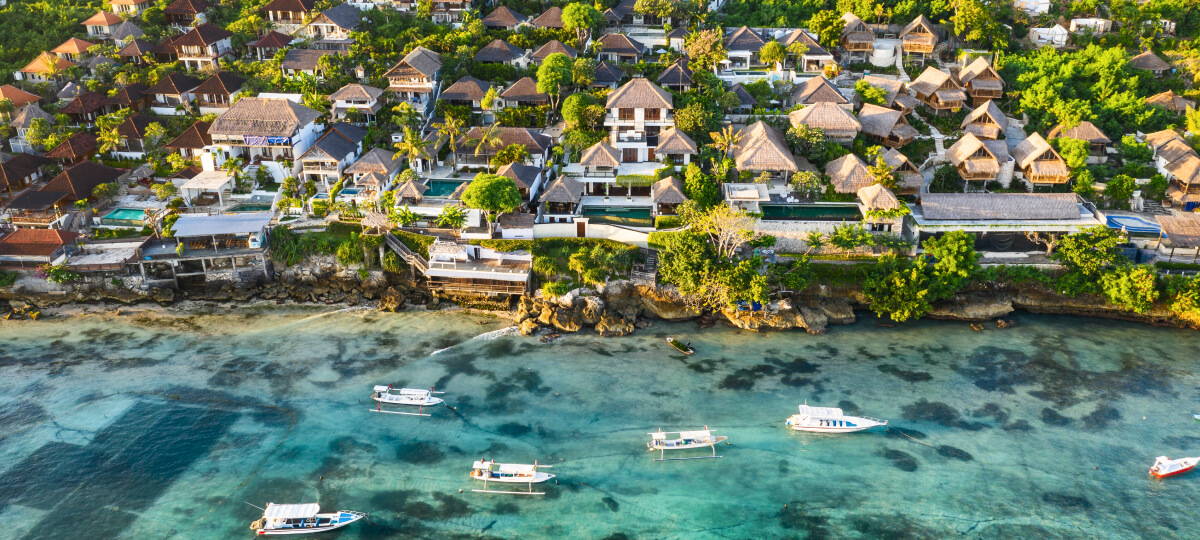
Buying Real Estate in Bali: All you need to know in 2025
Living in Paradise: Why Bali Captivates the World
 ✦ Picture waking up to the sound of waves gently crashing against the shore, surrounded by lush rice terraces shimmering in the tropical sun. Bali is a real dream destination for the most satisfying lifestyle. With its vibrant culture, kind-hearted locals, and an atmosphere that invites you to slow down and breathe, the island offers a way of life that feels far removed from the chaos of the modern world. ✦
✦ Picture waking up to the sound of waves gently crashing against the shore, surrounded by lush rice terraces shimmering in the tropical sun. Bali is a real dream destination for the most satisfying lifestyle. With its vibrant culture, kind-hearted locals, and an atmosphere that invites you to slow down and breathe, the island offers a way of life that feels far removed from the chaos of the modern world. ✦
| It's no wonder people from around the globe are flocking to this island paradise, not just to visit but to invest in their own piece of it. |
Real estate here grows with very comfortable, unique amenities and appealing prices.
The government is also pushing initiatives to attract more investors to Indonesia in general. The golden visa program, which began in the second half of 2024, raised over $500 million in investments and majorly contributed to the country's revenue.
Owning property in Bali is an enticing prospect, but it requires a clear understanding of the island's legal and market intricacies.
➞ Let's break it down so you can realize your dream of owning property in Bali.
Can Foreigners Buy Property in Bali? Understanding the Legal Framework
 Yes, Foreigners can purchase property in Bali, but not through outright freehold ownership. Indonesia's property laws are designed to maintain local land ownership while offering alternatives for foreign investors to participate in the market.
Yes, Foreigners can purchase property in Bali, but not through outright freehold ownership. Indonesia's property laws are designed to maintain local land ownership while offering alternatives for foreign investors to participate in the market.
Here are the primary legal avenues ➞
Hak Pakai (Right to Use):
|
Hak Guna Bangunan (Right to Build):
|
* Using these legal channels, you can invest securely and avoid the pitfalls of illegal nominee arrangements, which offer no legal protection and could result in losing your investment.
Best Areas to Buy Property in Bali
 Bali's diverse landscape means there's a perfect location for every type of investor. And it's true that the conditions and lifestyle differ a lot from one location to another, as does the mentality of foreigners choosing these places.
Bali's diverse landscape means there's a perfect location for every type of investor. And it's true that the conditions and lifestyle differ a lot from one location to another, as does the mentality of foreigners choosing these places.
Here's an overview of the island's property zones:
∗ Pink Zones (Tourism Hotspots):
Areas like Kuta, Seminyak, and Nusa Dua are buzzing with activity and cater to Bali's ever-growing tourist population. These are very young areas, so many digital nomads choose to live here. The beaches are wide and nice, perfect for surfing, and the areas are full of nice cafes and workplaces and great leisure places to enjoy the nightlife.
These zones are prime spots for hotels, villas, and short-term rental properties, offering high returns on investment. However, competition is fierce, and property prices reflect the demand.
∗ Orange Zones (Residential Development):
Neighborhoods such as Denpasar, Kerobokan, and Pererenan strike a balance between accessibility and tranquility. A bit far from the first line of beaches, these zones are a bit less populated with foreigners, but that doesn't make them less attractive. Even the opposite, these areas are increasingly popular for locals and those who want to be further from the hectic environment. So, for long-term rental properties or family homes, watch these.
∗ Green Zones (Natural Retreats):
If you're drawn to the serene beauty of Ubud, Sanur, or similar areas, you'll find properties in green zones offer a more tranquil lifestyle. Development is restricted here, preserving the area's natural beauty and ensuring a quieter environment.
Each zone has its own set of regulations, so it's important to align your investment goals with the location's zoning restrictions.
Learn more about the zones here.
What to Watch Out for When Investing
 Investing in Bali can be rewarding, but navigating potential risks is essential. Here are some critical factors to consider:
Investing in Bali can be rewarding, but navigating potential risks is essential. Here are some critical factors to consider:
➥ Zoning Regulations:
-
Zoning dictates how the land can be used. For instance, building a commercial property in a green zone is prohibited, and violations can result in hefty fines or demolition orders. Always confirm the zoning classification before purchasing.
-
Future zoning changes may impact your investment. Stay informed about local development plans that could reclassify or restrict certain areas.
➥ Legal Compliance:
-
Nominee arrangements are commonly used but risky. While an Indonesian citizen may hold the title on your behalf, this arrangement has no legal standing and could jeopardize your investment. Stick to Hak Pakai or Hak Guna Bangunan to ensure compliance with Indonesian law.
-
Ensure the seller has clear ownership and the legal right to sell the property. Hire a qualified notary (PPAT) to verify documents and oversee the transaction.
➥ Infrastructure and Accessibility:
-
The quality of infrastructure in Bali can vary greatly. While tourist hubs are well-developed, rural areas may lack reliable roads, utilities, or internet access.
-
Check for planned infrastructure improvements, such as new highways or airport expansions, which can significantly boost property values.
➥ Environmental Risks:
-
Bali's tropical climate means flooding, landslides, and erosion are potential concerns. Have a geotechnical survey conducted to assess the property's safety and sustainability.
-
Be aware of local environmental laws, particularly if the property is near protected areas or sacred sites.
➥ Market Dynamics:
-
Bali's real estate market is closely tied to its tourism sector. Changes in global travel trends or government regulations can affect demand and rental yields.
-
Work with local experts to understand the market's current state and potential future shifts.
The Step-by-Step Process of Buying Property in Bali
 Investing in Bali's property market requires careful planning and execution. Here's a roadmap to guide you:
Investing in Bali's property market requires careful planning and execution. Here's a roadmap to guide you:
✓ Obtain an Indonesian Tax Identification Number (NPWP):
This is mandatory for property transactions and ensures tax compliance.
✓ Establish a PT PMA (if applicable):
If you plan to use the Right to Build, you must set up a foreign-owned company. This can take a few weeks and requires legal assistance.
✓ Conduct Thorough Due Diligence:
- Verify the property's ownership history and zoning classification.
- Check for any encumbrances, such as liens or unpaid taxes.
- Investigate potential environmental risks, like flooding or erosion.
✓ Negotiate and Finalize Contracts:
Work with a qualified notary to draft and review agreements, ensuring all terms are clear and enforceable.
✓ Register the Property:
File the necessary documents with the National Land Agency (BPN) to secure your ownership rights.
✓ Obtain Building and Operational Permits:
If you plan to develop the property, ensure all required permits are in place before starting construction.
✓ Complete the Transaction:
Transfer funds through a reputable bank and receive your official property certificate.
Future Outlook for Bali's Real Estate Market
Bali's property market shows no signs of slowing down. Major infrastructure projects, such as new highways and airport expansions, are expected to boost accessibility and property values in key areas.
The growing popularity of eco-friendly developments and digital nomad-friendly zones also presents new investment opportunities. However, with demand rising, the competition for prime properties is increasing, making early investment more critical than ever.
Bali offers a great mix of lifestyle benefits and investment potential. Whether you dream of a beachfront villa, a boutique hotel in a bustling tourist place, or a tranquil retreat in the rice fields, the opportunities are as diverse as the island itself.
Contents
